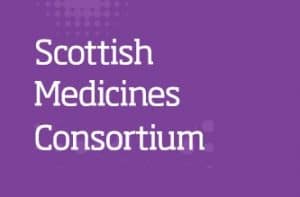The Scottish Medicines Consortium (SMC), which provides advice to NHSScotland about the value for patients of every newly licensed medicine, has today (Monday 11 March) published advice accepting two new medicines.
Liposomal daunorubicin/cytarabine (Vyxeos) was accepted for the treatment of adults with a high-risk type of acute myeloid leukaemia (AML), a rare, aggressive and rapidly progressing cancer of the white blood cells. Patient groups highlighted how current standard chemotherapy treatment is extremely toxic and also requires prolonged inpatient hospital stays. Vyxeos contains daunorubicin and cytarabine in tiny fat droplets called liposomes designed to allow these medicines to remain in the patient’s body for longer and build up in their bone marrow. Liposomal daunorubicin/cytarabine can improve remission rates and overall survival, and offers an increased chance of stem cell transplant which is a potentially curative option. It also has the advantage of fewer doses and shorter inpatient stays than current treatment options.
Letermovir (Prevymis) was accepted following consideration through the SMC’s Patient and Clinician Engagement (PACE) process for medicines for end of life and very rare conditions. It is used to prevent illness due to cytomegalovirus (CMV) infection in patients who have received a stem cell transplant. Through PACE, the committee heard that while rare, CMV infection can result in serious illness and delay recovery from stem cell transplantation. There are limited treatment options for patients at present. As an antiviral medicine, letermovir can help prevent this complication in those who have undergone transplants.
The committee was unable to accept tisagenlecleucel (Kymriah) for adult patients with diffuse B cell lymphoma who have relapsed or not responded after two previous lines of treatment. As a treatment for a rare condition, tisagenlecleucel was considered through PACE, where participants discussed the potential for long term disease control and the possibility of extending life in some patients. Despite the additional flexibility the PACE process allows, the committee did not recommend tisagenlecleucel because of uncertainties in the company’s evidence around its long term benefits.
SMC Chairman Dr Alan MacDonald said:
“We are pleased to be able to accept these two new medicines for use by NHSScotland.”
“Patients with high-risk acute myeloid leukaemia have a very poor prognosis and high unmet need. Liposomal daunorubicin/cytarabine offers an improvement in overall survival and may lead to a potentially curative stem cell transplant for some patients.”
“For patients who have undergone a stem cell transplant, letermovir can aid their recovery by reducing the risk of CMV infection.”
“Although the PACE process gives our committee members additional flexibility in their decision making, they were unable to accept tisagenlecleucel (Kymriah) for patients with lymphoma as the company’s evidence around its long-term benefits was not clear.”
Further details of all medicine decisions can be found on our website, www.scottishmedicines.org.uk.


